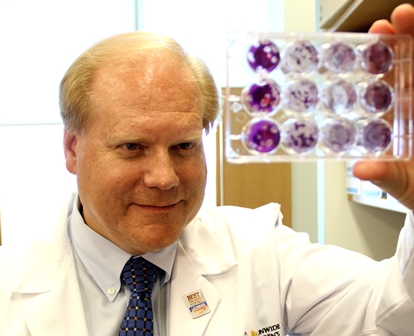Parents do everything they can to protect their children against all of the nasty germs floating around classrooms across the country this time of year. Doctors and researchers at Nationwide Children’s Hospital, however, are looking into how those same types of common viruses can actually help treat a child who is diagnosed with certain cancers.
This novel approach is called, viral therapy. It involves slightly altering a virus in the laboratory, injecting it directly into a solid cancer tumor which then causes the tumor to shrink and disappear altogether.
Several years of study into this approach have led scientists to find more and more evidence that oncolytic viruses show promise as anticancer agents with variations of the herpes simplex virus (HSV) among the most commonly used. Viral therapy has been studied in adults, but only a few institutions have studied it in kids.
“Virus therapy is a very promising area of cancer treatment,” said Timothy Cripe, MD, PhD, division chief of Hematology/Oncology and Bone Marrow Transplantation at Nationwide Children’s. “By injecting the tumor directly with a virus, it will cause the body’s immune system to react and attack that tumor while preserving the body’s healthy cells.”
For the damage that the virus does to the tumor, it does not have any effect on the healthy tissue surrounding the tumor and cells throughout the body. That means there are very few, if any, side effects from the treatment. Further, viral therapy could make a world of difference for pediatric cancer patients that would otherwise be treated with chemotherapy. Those patients would not have to experience the common side effects from chemo including hair loss, fatigue, nausea and weight loss/gain.
Dr. Cripe and his team will soon launch a phase I clinical trial at Nationwide Children’s which will study viral therapy for solid cancer tumors in kids. They will be looking at this treatment for cancers such as neuroblastoma and sarcoma.
In March earlier this year, Dr. Cripe, also a faculty member at The Ohio State University College of Medicine, and his team published findings in Molecular Therapy which shed additional light on how viral therapy combined with drugs that attack the tumor blood vessels and simultaneously selectively suppress the immune response within the cancer could be more effective against treating solid tumors.
Watch Dr. Cripe explain how viruses are used to treat pediatric cancer.
Dr. Cripe and his team are looking at viral therapy as a treatment for certain types of childhood cancer.

